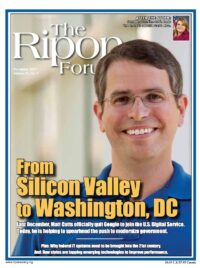(Hint: Focus on innovation, not individuals)

Republicans have long been the party of tax cuts. But lately they have been joined by a broader coalition concerned about the impact of high corporate tax rates on national competitiveness and economic growth. The outline of a possible bipartisan compromise emerged last year with a series of positive bipartisan reports from the Senate Finance Committee. However, rather than pursue the possibility of a bipartisan bill centered on cutting the corporate tax rate and encouraging investment, Republicans seem determined to pass a partisan bill that gives large tax breaks to wealthier Americans. They are likely to fail.
There is strong evidence that high corporate tax rates deter investment. This is especially worrisome because the United States has the highest tax rate among Organization for Economic Cooperation and Development (OECD) countries. Unlike most countries, it also applies this rate to foreign profits. The result is that U.S. companies are less competitive in foreign markets. In addition to lower rates, incentives for investment such as the R&D tax credit, faster depreciation, and even lower rates from profits derived from intellectual property would all increase growth. Many Democrats recognize this problem and opportunity and are willing to make U.S. tax law more competitive.
The Republican plan addresses many of these challenges. But these corporate reforms have been overshadowed by large tax cuts to the wealthy and small businesses. Although Republicans claim that these cuts will also spur investment, the link between individual tax rates and growth is much weaker. That is partly because the total tax burden on corporations is much higher than it is for individual owners of a partnership or sole-proprietorship. It is also because fewer “pass-through” businesses compete globally or require large investments. There is no Democratic support for individual tax cuts for the wealthy. In fact, growing concern over inequality and rising federal deficits will make this a tough sell even to the Republican base.
There is strong evidence that high corporate tax rates deter investment. This is especially worrisome because the United States has the highest tax rate among OECD countries.
What could Republicans do to increase the chances of passing a good bill? They could focus principally on reforming the corporate tax code. The Information Technology and Innovation Foundation has listed five imperatives for corporate tax reform. The first of these is a statutory corporate rate somewhere between 20 and 25 percent. Lower rates are possible in a revenue neutral bill if Congress is willing to raise tax rates on individuals (or institute a carbon tax), but, given the current stalemate, anything lower than 25 percent should be counted a great success. This should be accompanied by a 15 percent tax on foreign earnings with no deferral, for which companies would get a credit for any foreign tax they pay.
The other three imperatives are all aimed at encouraging more investment and research in the country and would automatically be available to pass-throughs. Academic studies show that each of these is effective at boosting economic activity. The first involves raising the simplified version of the research and development tax credit by six percentage points, to 20 percent of qualified research expenditures. The second is to copy other nations and implement an “innovation box” that taxes profits from intellectual property at a rate close to 15 percent. Finally, investment incentives should be increased by allowing every company immediately to write off the first $500,000 plus 50 percent of any remaining investment.
In addition to lower rates, incentives for investment such as the R&D tax credit, faster depreciation, and even lower rates from profits derived from intellectual property would all increase growth.
The Republican plan comes close (it does not raise the R&D credit or institute an “innovation box”). But it also includes a large amount of tax cuts on individuals and small businesses. These cuts are unlikely to produce much economic growth. By their nature they benefit the wealthiest individuals. The low rates on small businesses also add to the incentives to characterize wages as business income. These tax cuts also worsen the federal deficit, necessitating future cuts in middle-class spending programs or future tax increases. Finally, no Democrat is likely to vote for them.
Many Republicans believe that it is politically impossible to pass a bill that does not include tax cuts for individuals and small businesses. They are about to discover that it is impossible to pass a bill that does. Small businesses are not harmed by corporate tax cuts because corporations pay two levels of tax whereas most small businesses only pay one, and pass-throughs are already subsidized through the tax code to a tune of almost $180 billion per year. Moreover, more competitive U.S. corporations would mean increased sales for small businesses. And small businesses would benefit from the added incentives to invest and conduct research.
Our system is built on compromise. Parties that use narrow majorities to push through legislation tend to exceed their political support and find themselves on the defensive. Leadership consists of accomplishing what is possible, not arguing for the impossible. A bipartisan bill that increases America’s competitiveness and boosts incentives to invest here is possible. One that lowers taxes on the wealthy in exchange for a promise of future growth is not.
Joe Kennedy (@JV_Kennedy) is a senior fellow at the Information Technology and Innovation Foundation, a leading science and tech-policy think tank, where he focuses on tax and regulatory policy.




